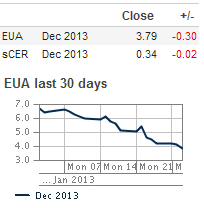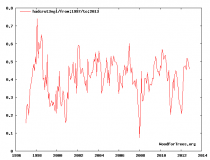Earth’s average temperature has risen by 0.8 degrees over a hundred years, particularly during the two warming periods: 1910 to 1940 (0.3 degrees) and 1980-2000 (0.5 degrees). Most of the recent increase is due to human emissions.
They last about 15 years, warming has paused. What it depends on is unclear. It is probably a natural variation. This means that the temperature trend right now is far below the IPCC four degrees scenario. The trend will be in the future is unclear, but is likely to break a sign that the climate sensitivity is somewhat lower than in the first models.
Koldioxidhaltens heating effect is logarithmic: the higher the concentration is, the smaller the effect of a further increase.
More heat waves and fewer cold periods are to be reckoned with and can already be observed. The other forms of extreme weather would have increased there is no evidence. In the case of storms seen no change in future models.
The sea level has risen fairly evenly for a hundred years by 2-3 millimeters per year. The pitch is not accelerated.
Yes, humans affect the climate. But no, there is no indication that the warming is so serious that we need to panic. It says Lennart Bengtsson, one of the most highly qualified Swedish climate scientists, who has recently become “increasingly frustrated” by the debate.
One of the climate debate curses is that it is often presented as if it consisted of two camps: those who understand that man is causing the warming of the earth and those who deny this. How easy is seldom reality, especially in science. It’s one of the messages from the climate scientist Lennart Bengtsson.
- We create a great anxiety, but it is justified, and it does not lead to any action. The key is to come up with reasonable solutions, he says to DN.
Lennart Bengtsson was the head of the great European weather center of English Reading in the 1980s, he was director of the Max Planck Institute in Hamburg in the 1990s (and still have one Emeritus service there), he sits at the head of atmospheric and Space Institute ISSI in Bern and is a member of the Academy of Sciences. Nowadays, he is also a visiting professor at Uppsala.
He participated in the earliest work of the UN climate panel, and he felt the panel’s first chairman Bert Bolin well. Since then he has followed their work closely and contributed background.
Bengtsson has worked abroad for many decades and has not made much noise in the Swedish climate debate. But recently he has become involved in discussions in blog forums and opinion pieces, including one DN messages published a few days after this interview was conducted.
- I have become increasingly frustrated at the lack of scientific basis of much of what is said in the media. It goes out over science in the long run.
That carbon dioxide and other greenhouse gases raise the temperature has been known for over 100 years, and that humans are contributing to carbon dioxide in the atmosphere is by now also hardly any who doubt. But just how big is the effect of this is far from settled. There have been estimates pointed to a great effect, and they often come into focus. But there have also been studies that suggest a smaller effect. The only sure thing is what has so far been able to measure.
- The warming Earth experienced the last hundred years is so small that it was not noted if the meteorologists and climatologists informed about it. It indicates that the climate sensitivity is probably lower than climate models, at least initially adopted, says Bengtsson.
UN climate panel says in its latest report that a doubling of carbon dioxide levels likely to result in a warming of around 3 degrees. So far, the 0.8 degrees since the 1800s, and then ten fifteen years, the curve has become flatter, while greenhouse gas emissions continued at the same pace as before.
- There is no doubt that humans have an impact. What we are not sure about is why the warming is so slow. It is possible that the planet cools more efficiently than we had previously expected. It is also possible to store more heat in the deep sea, so that there is inertia.
Lennart Bengtsson responded to a report of an Institute in Potsdam, published by the World Bank at the height of the climate meeting in Doha last fall. It was described generally as if it could be established that the earth is headed for four degrees of warming. It does now not report, but it is about what is likely to happen if it gets much hotter.
- I am critical. They used one of the more extreme options in the scenarios. Of course it is not completely out of the question, but the probability is very low.
Bengtsson admits that it would probably be worse if the risks were ignored completely over exaggerated, but he believes that faith in science is damaged if you hunt up a black scenario and then not much happens.
That such a complicated science that climate communicated to laymen as widely made now is a problem, he says, because the messages are black and white and simplistic conclusions.
- It is always so when it becomes a hype issue that some people become very involved. But many of them are not always the most special, and a lot of very talented researchers are not particularly interested in media activities. Some researchers feel frustrated and provoked, and sometimes they give in to pressure and gives indications that it is safer than it is.
- When you work actively with a question you can see the difficulties. Climate is extremely complicated. What I find it very difficult to explain to people is the chaotic aspect, which is not predictable. It is a fundamental property that can not be changed.
A notable part of the climate scenarios is about extreme weather. In addition to more heat waves and fewer cold days is no clear evidence that extreme weather events have increased.
- They may be called activists who feel the need to warn people of an impending disaster, they apprehended course of some frustration and takes the extreme event anywhere and say they depend on climate change no.
- And has profiled itself is well a tendency to hold on to it.
It Lennart Bengtsson conveys not different from scientific colleagues in the UN climate panel concluded . However, for anyone who is familiar with a topic that one can emphasize some seeds and downplay others.
Although not the apocalypse is around the corner, we should definitely put our energy system, says Lennart Bengtsson. He thinks that the UN’s climate panel, the IPCC is good, “because otherwise we would be flooded by the biased reports, the World Bank.”
- On the other hand, climate change has become extremely politicized. The issue is so complex that one can not ask the people to be convinced that the whole economic system must be changed just because you have done some computer simulations.
- As long as it does not happen anything serious, we must accept that it attacks the issue gradually. You can always ask how anxious you should be for something that happens in a hundred years. One must be realistic, pose the problem in relation to what can be solved and how safe it is.
- All right, if we want to be eccentric, one can say that there is a disaster in slow motion. If greenhouse gases would continue to increase by a factor of five or ten, then there will be problems of various kinds. But until further notice, the internal natural processes almost completely dominated.
UN climate panel presents its next scientific report in Sweden in september, six years after the last one.
What major changes do you think will be in the report?
- I do not think there will be some dramatic changes. We will take note, just as has been done continuously, that the climate system is a bit more complex than originally thought.
Anders Bolling anders.bolling @ dn.se READ MORE: ”Climate Panel to provide a balanced view”
By Andrew Bolt
The Gillard Government’s carbon trading plans are in tatters after two developments in Europe overnight, leaving it staring at billions of dollars in Budget deficits.
First, the EU carbon trading scheme to which the Government linked Australia from 2015 has been rocked with fresh evidence of fraud:
Two board members at Deutsche Bank, including the lender’s co-chief executive, have been drawn into a police investigation into tax evasion related to the group’s carbon trading business…
The investigation is centred on 25 of the bank’s staff, according to German prosecutors, and involves allegations of tax evasion, money laundering and obstruction of justice linked to carbon trading certificates.
But worse, the price for carbon credits has plunged again - to just $4.45 a tonne, a fraction of the current Australian price of $23.
European Union carbon permits had their biggest ever monthly drop as nations in the bloc may object to a regulatory plan to temporarily cut the volume of supply sold at auctions through 2015.

Carbon permits for December declined 10 percent today to close at a record 3.42 euros....The contract fell 49 percent this month… This is a disaster for the Gillard Government, whose decision to set our own price at $23 a tonne looks even more reckless.
But also remember how Climate Change Minister Greg Combet hailed the agreement last year to link the Australian carbon scheme to Europe’s from 2015, when the carbon tax will turn into a price set by trading instead:
“Linking the Australian and European Union systems reaffirms that carbon markets are the prime vehicle for tackling climate change and the most efficient means of achieving emissions reductions.” Mr Combet said..."”
“It is further evidence of strong international cooperation on climate change and will build further momentum towards establishing a robust international carbon market.”
And Combet gave this assurance:
Mr Combet repeated he was confident of the Treasury modelling, which predicts a $29 a tonne carbon price in 2015/16.
He was asked if the government would face a budget shortfall, in contrast to the $9.4 billion of revenue it had predicted the floating price would generate in the 2015/16 budget.
“It is three years away and the Treasury modelling is something that we stand by,” Mr Combet said.
Now Combet’s mendacious spin has been shattered. The European market is not “efficient” but possibly corrupt.
More seriously, the international price is virtually certain to be not $29 two years from now, but much, much less. The price will probably be so low that it will drive no move to green power.
It will also force the Government to slash its carbon tax compensation to consumers - or else rack up massive losses from funding handouts pegged at a $23 tonne tax through the sale of carbon allowances that must fall to worth, what, $10 to keep us competitive?
Note, not all the Australian credits can be bought overseas:
Under present rules, Australian companies can buy 50 per cent of carbon credits from overseas: 37.5?per cent can be from the European market and 12.5 per cent can be even cheaper international permits.
How cheap?
Take New Zealand’s:
Spot permits in the New Zealand Emissions Trading Scheme (ETS) fell 6.5 percent week-on-week to close Thursday at NZ$2.45 ($2.05), the lowest weekly closing price ever recorded as fresh supply continued to find its way to the market.
To summarise. The Government’s carbon price from 2015 is almost certain to be:
- higher on average than prices overseas.
- too low to fund the current compensation to consumers, leaving the Budget short of billions of dollars.
- too low to drive any big cut in emissions.
More from Watts Up with That.
Meanwhile in the US, a team of scientists who have benefited from government largesse (your tax dollars) for many years assembled by the professional societies plan a three day visit to lobby congress to enact carbon taxes here in the US to combat global warming that stopped 16 years ago. Their goal is to keep try the same failed Ponzi scheme here and keep the lucrative grant gravy train on the track. The Obama administration like the President himself is all ears.

Gore did the NBC rounds this week on the Today show with Matt Lauer and then on the equally empty-headed David Letterman to use Sandy and the Australian Cyclone Oswald which brought flooding and sea foam (not uncommon in tropical storms) to Australia as proof he was right after all. Of course the 20- foot sea level rise he predicted looks like will be more likely 7 inches by 2100. Instead of the studio crane he could have used the Manhattan Yellow pages to illustrate the effect in AIT. Lord Stern despite proclamations throughout Europe of concern that the greenhouse theory is failing - with a 16 year lack of warming that has the scientists ‘baffled’ in the words of the hard left enviro friendly Spiegel/Euro-Media said he was not alarmist enough.

Lord Stern now believes he should have been more 'blunt about threat to economies from temperature rises. Photograph: Sarah Lee for the Guardian
Lord Stern, author of the government-commissioned review on climate change that became the reference work for politicians and green campaigners, now says he underestimated the risks, and should have been more "blunt" about the threat posed to the economy by rising temperatures. What do Gore and Stern do when presented with the facts. They double down...much as was predicted in 'When Prophecies Fail".
In an interview at the World Economic Forum in Davos, Stern, who is now a crossbench peer, said: "Looking back, I underestimated the risks. The planet and the atmosphere seem to be absorbing less carbon than we expected, and emissions are rising pretty strongly. Some of the effects are coming through more quickly than we thought then."
The Stern review, published in 2006, pointed to a 75% chance that global temperatures would rise by between two and three degrees above the long-term average; he now believes we are "on track for something like four '. Had he known the way the situation would evolve, he says, "I think I would have been a bit more blunt. I would have been much more strong about the risks of a four - or five- degree rise."
He said some countries, including China, had now started to grasp the seriousness of the risks, but governments should now act forcefully to shift their economies towards less energy-intensive, more environmentally sustainable technologies.
"This is potentially so dangerous that we have to act strongly. Do we want to play Russian roulette with two bullets or one? These risks for many people are existential."
Stern said he backed the UK's Climate Change Act, which commits the government to ambitious carbon reduction targets. But he called for increased investment in greening the economy, saying: "It's a very exciting growth story."

David Cameron made much of his environmental credentials before the 2010 election, travelling to the Arctic to highlight his commitment to tackling global warming. But the coalition’s commitment to green policies has recently been questioned, amid scepticism among Tory backbenchers about the benefits of wind power, and the chancellor’s enthusiasm for exploiting Britain’s shale gas reserves.
Stern’s comments came as Jim Yong Kim, the new president of the World Bank, also at Davos, gave a grave warning about the risk of conflicts over natural resources should the forecast of a four-degree global increase above the historical average prove accurate.
“There will be water and food fights everywhere,” Kim said as he pledged to make tackling climate change a priority of his five-year term.
Kim said action was needed to create a carbon market, eliminate fossil-fuel subsidies and “green” the world’s 100 megacities, which are responsible for 60 to 70% of global emissions.
He added that the 2012 droughts in the US, which pushed up the price of wheat and maize, had led to the world’s poor eating less. For the first time, the bank president said, extreme weather had been attributed to man-made climate change. “People are starting to connect the dots. If they start to forget, I am there to remind them. We have to find climate-friendly ways of encouraging economic growth. The good news is we think they exist”.
Kim said there would be no solution to climate change without private sector involvement and urged companies to seize the opportunity to make profits: “There is a lot of money to be made in building the technologies and bending the arc of climate change.”


